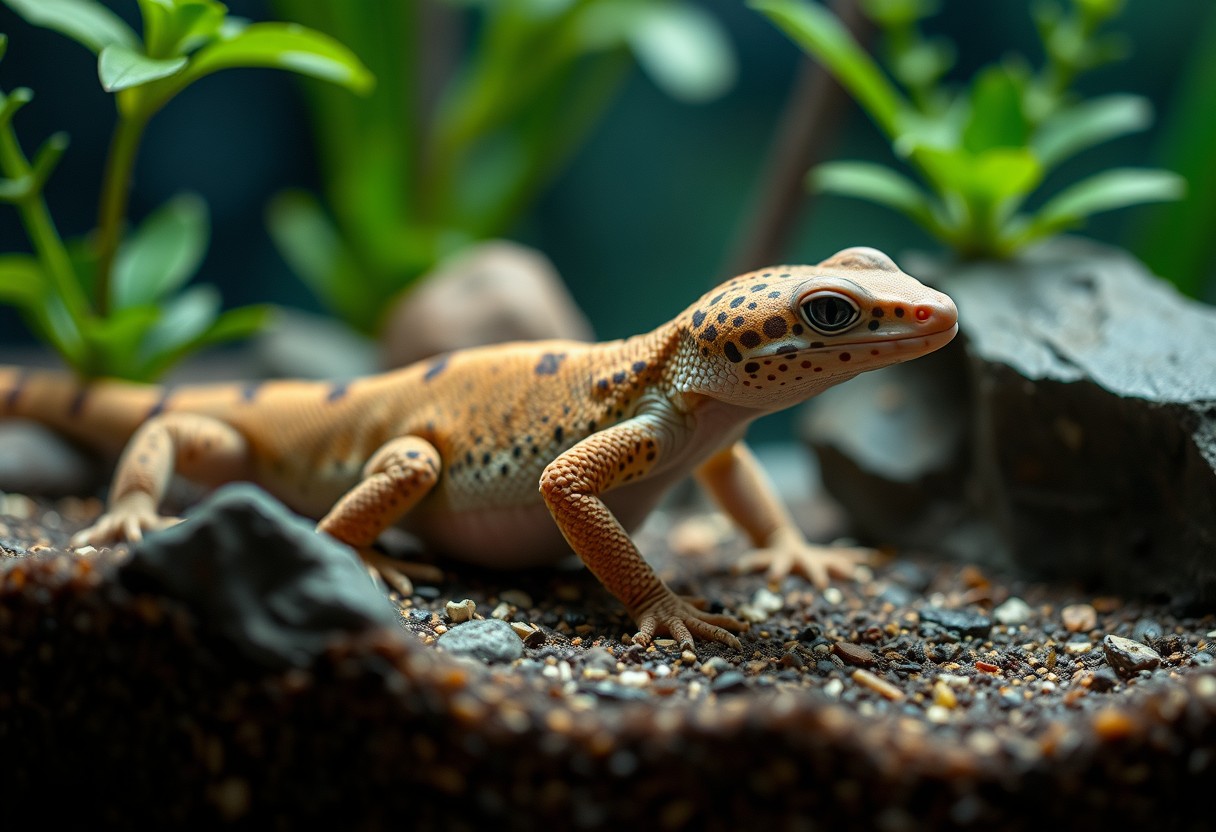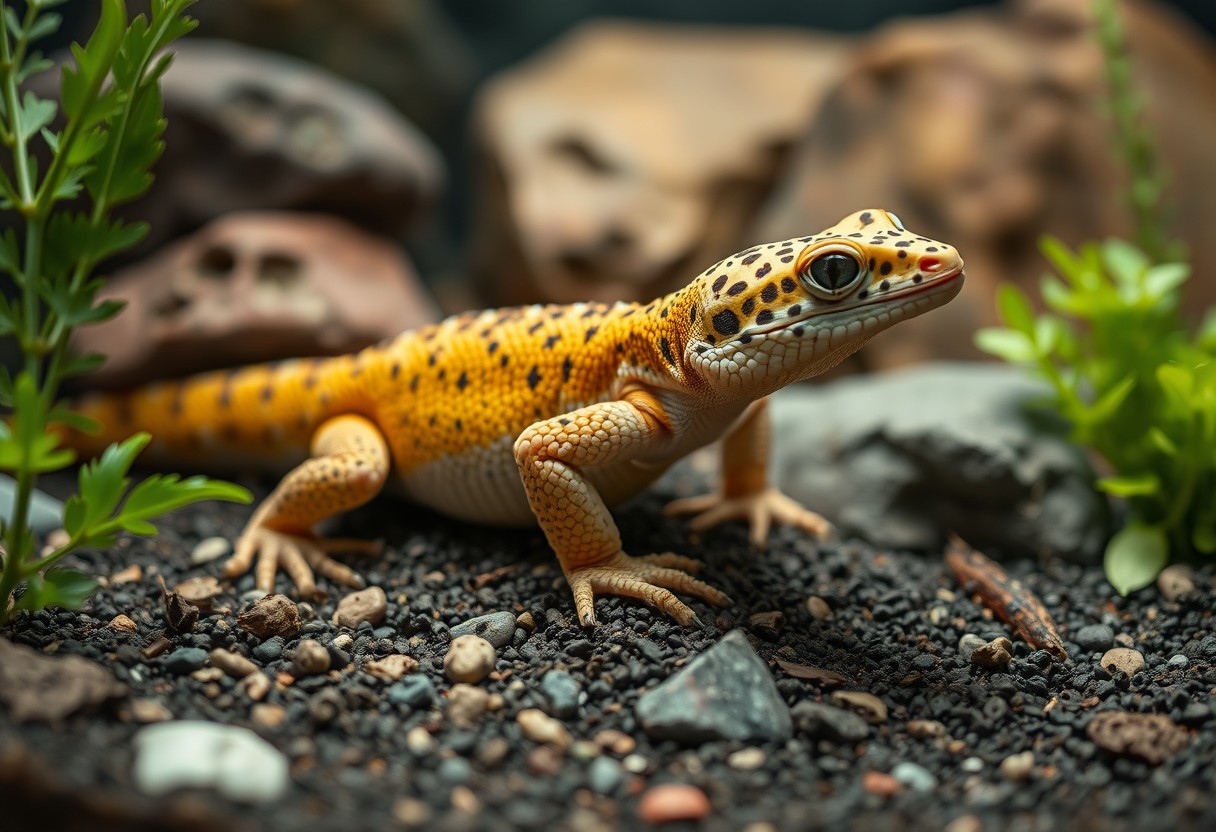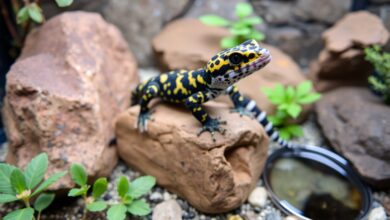Egg Binding in African Fat-Tailed Geckos – Symptoms, Prevention, and Treatment

It’s necessary to understand the serious condition known as egg binding that can affect your African fat-tailed geckos. This condition occurs when a female is unable to lay her eggs, leading to potentially life-threatening complications. In this blog post, we will explore the symptoms to watch for, effective prevention strategies you can implement in your gecko’s habitat, and the best treatment options available to ensure the health and wellbeing of your pet. Being informed about egg binding will help you provide the best care possible for your gecko.

Key Takeaways:
- Symptoms: Common signs of egg binding in African fat-tailed geckos include lethargy, loss of appetite, straining to lay eggs, and swollen abdomen.
- Prevention: To reduce the risk of egg binding, provide appropriate nesting sites, maintain optimal temperature and humidity levels in their habitat, and ensure a well-balanced diet enriched with calcium.
- Treatment: If egg binding occurs, consult a veterinarian for potential treatments which may include fluid therapy, hormonal treatments, or, in severe cases, surgical intervention to help the gecko safely lay the eggs.
Understanding Egg Binding
Your African fat-tailed gecko’s health is vital, and understanding egg binding is necessary for their well-being. Egg binding occurs when a female gecko cannot lay her eggs due to various physical or environmental factors. This condition can lead to severe health complications if not addressed promptly, so being aware of the signs and prevention methods can make a significant difference in your pet’s life.
What is Egg Binding?
On a fundamental level, egg binding is a reproductive issue that occurs when a female gecko retains her eggs inside her body instead of laying them. This situation can result in discomfort, pain, and can even jeopardize her life if not treated. Identifying the symptoms early could be key to providing the necessary care.
Causes of Egg Binding in African Fat-Tailed Geckos
Along with improper husbandry practices, various factors contribute to egg binding in African fat-tailed geckos. Inadequate nesting sites, low humidity levels, and a lack of calcium or other necessary nutrients can increase the likelihood of this troubling condition.
Binding occurs due to multiple factors, including stressful environments, poor diet, and insufficient temperatures or humidity in the habitat. If your gecko’s home lacks a proper nesting area or if she is not receiving enough calcium and vitamins, it can result in difficulty laying eggs. Additionally, a sedentary lifestyle without adequate exercise opportunities may also contribute to this issue. Taking proactive steps to ensure a healthy, comfortable environment can significantly reduce the occurrence of egg binding.
Symptoms of Egg Binding
Some signs that your African fat-tailed gecko may be experiencing egg binding include lethargy, a loss of appetite, and swelling or distension in the abdomen. Being aware of these African fat tailed gecko egg problems can aid in early identification. Rapid intervention is vital to ensure a favorable outcome for your gecko.
Physical Signs
Binding geckos often exhibit a visibly distended abdomen, which may appear larger than normal. You might also notice straining while trying to pass eggs or noticeable discomfort when handling your pet.
Behavioral Changes
Physical signs can be accompanied by significant behavioral changes in your gecko. If you observe your pet becoming reclusive, displaying signs of stress, or having difficulty moving, these may indicate that it is egg-bound.
Considering your gecko’s overall well-being is important, as behavioral changes can be a strong indicator of underlying health issues. If your African fat-tailed gecko shows signs of weakness, changes in its typical sleeping patterns, or unusual aggression, these could point to serious health problems. Quick assessment and timely veterinary care are necessary to prevent complications in such scenarios.
Diagnosis of Egg Binding
To accurately diagnose egg binding in your African Fat-Tailed Gecko, it’s necessary to observe any changes in behavior, appetite, or physical appearance. Seek professional help if you notice symptoms, as timely intervention is key. Your veterinarian may refer to resources about Hemitheconyx caudicinctus – African Fat-Tailed Gecko for specific guidance tailored to your pet’s needs.
Veterinarian Assessment
Among the first steps in diagnosing egg binding is a thorough assessment by a veterinarian who specializes in reptiles. They will conduct a physical examination, checking for any signs of distress, dehydration, or abnormal abdominal swelling. Your vet may also inquire about your gecko’s diet, habitat, and recent behaviors to gather vital information.
Diagnostic Imaging
An effective diagnostic tool for confirming egg binding is imaging, which can reveal the presence of eggs within your gecko’s body. This often includes X-rays or ultrasound, allowing the veterinarian to visualize the reproductive tract.
With diagnostic imaging, you gain insight into the number and position of the stuck eggs, which is vital for crafting an effective treatment plan. It’s a non-invasive approach that can also help identify any potential complications such as blockages or other reproductive issues. Early detection through imaging can lead to more successful outcomes, ensuring your gecko receives the appropriate care without unnecessary stress.

Treatment Options
Keep in mind that effective treatment for egg binding addresses both the immediate issue and underlying causes. You should closely monitor your African fat-tailed gecko’s health, seeking veterinary advice when necessary. Treatment options may involve a combination of non-surgical and surgical interventions to help your gecko safely pass any retained eggs.
Non-Surgical Interventions
By using various non-surgical interventions, you can often help your gecko pass the retained eggs more easily. Methods include providing a warm environment to stimulate egg-laying, increasing humidity levels, and offering high-calcium diets. Nutritional supplements and hydration may also enhance overall health and aid in egg passage.
Surgical Intervention
Interventions like surgical intervention may become necessary for geckos who do not respond to non-surgical methods. In cases of severe egg binding where the eggs cause distress or significant health risks, a veterinarian may opt for surgery to safely extract the eggs. This procedure, performed under anesthesia, can alleviate your gecko’s condition but also carries inherent risks, making proper vet consultation important.
Non-surgical methods should always be attempted before considering surgery, as they are less invasive and have a higher success rate when successful. However, if your gecko shows signs of severe discomfort or health decline, surgical options may save their life. Act promptly in such scenarios, ensuring you consult an experienced veterinarian to evaluate your gecko’s condition accurately before proceeding with treatment.

Prevention Strategies
Many factors can contribute to preventing egg binding in African Fat-Tailed Geckos. By ensuring an ideal environment and addressing your gecko’s specific needs, you can significantly reduce the risk of this condition. Focus on proper husbandry practices and nutritional considerations to promote your gecko’s overall health.
Proper Husbandry Practices
With proper husbandry practices, you can create a suitable habitat for your African Fat-Tailed Gecko. Ensure that your enclosure maintains the right temperature and humidity levels, providing adequate hiding spots and nesting areas. Regularly clean the habitat and provide fresh water to keep your gecko comfortable and stress-free.
Nutritional Considerations
Before addressing the prevention of egg binding, it’s important to assess the nutritional aspects of your gecko’s diet. Supporting your African Fat-Tailed Gecko’s health with a balanced diet, rich in vitamins and minerals, can help in avoiding complications such as egg binding.
Hence, a varied diet is vital for maintaining optimal health in your African Fat-Tailed Gecko. Make sure to provide a blend of high-quality insects such as crickets and mealworms, supplemented with calcium and vitamin D3 to promote strong bone development. A deficiency in these nutrients can lead to weakened eggs and ultimately result in egg binding. Consult with a veterinarian for personalized dietary recommendations to ensure that your gecko is receiving the appropriate care.
When to Seek Veterinary Care
Once again, if you notice any signs of distress in your African fat-tailed gecko, it’s vital to consult a veterinarian immediately. Look for symptoms like prolonged straining, abdominal swelling, or a decrease in appetite. Ignoring these signs can lead to severe complications, so it’s important to act swiftly. Early intervention can significantly improve your gecko’s chances of recovery, ensuring they receive the appropriate treatment and support needed to regain their health. Taking prompt action is key to safeguarding your pet’s well-being.
Final Words
As a reminder, understanding egg binding in African fat-tailed geckos is crucial for your pet’s well-being. Be attentive to the symptoms, such as lethargy, straining, or abnormal posture. Preventive measures, including proper diet and habitat conditions, can minimize risks. Should you encounter this issue, timely veterinary intervention is key to ensuring your gecko’s health, so don’t hesitate to seek help if you suspect egg binding. Your knowledge and proactive care can make a significant difference in your gecko’s life.
FAQ
Q: What are the symptoms of egg binding in African Fat-Tailed Geckos?
A: Symptoms of egg binding in African Fat-Tailed Geckos can include a noticeable bloating of the abdomen, lethargy, difficulty moving, a lack of appetite, and signs of distress such as frequent attempts to dig or hide. You might also observe the gecko straining or showing signs of discomfort when trying to lay eggs. In severe cases, the gecko may become less responsive or exhibit signs of dehydration and weakness. It’s important to monitor your gecko closely, especially if they are of breeding age.
Q: How can I prevent egg binding in my African Fat-Tailed Gecko?
A: Prevention of egg binding involves ensuring proper husbandry practices. Providing an appropriate diet rich in calcium and vitamin D3 is vital to support reproductive health. Offer a nesting site with suitable substrate, like moist soil or sphagnum moss, which encourages digging and laying behaviors. Regular health check-ups with a veterinarian experienced in reptiles can also help identify any underlying health issues early on. Ensuring the right temperature and humidity levels in the enclosure is vital, as stress from improper care can contribute to egg binding.
Q: What treatment options are available for an African Fat-Tailed Gecko that is egg bound?
A: Treatment for egg binding often requires veterinary intervention. A qualified veterinarian may perform a physical examination and possibly imaging studies to confirm egg binding. Depending on the severity, treatment options can include providing supportive care such as hydration and nutritional support, inducing egg-laying through hormonal injections, or, in more serious cases, surgical intervention to remove the eggs. It’s important to consult with a veterinarian experienced in reptile care immediately if you suspect your gecko is suffering from egg binding.





